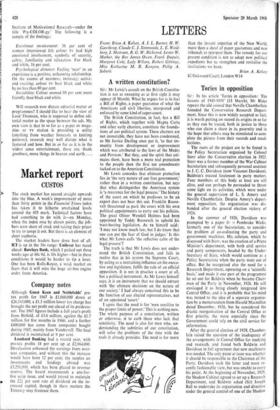A written constitution?
LETTERS
From: Brian A. Kelsey, A. I. L. Barnes, H. W. Gawthrop, Claude C. I. Simmonds, L. E. Weld- berg, J. Mottram, R. G. W. Rickcord, Lester W. Mather, the Rev James Owen, Frank Dupuis, Margaret Cole, Lady Wilson, Robert Gittings, Miss Katharine M. R. Kenyon, Philip A. Sabetti.
Sir: Mr Lewis's assault on the British Constitu- tion is not as sweeping as at first sight it may appear (8 March). What he argues for is in fact a Bill of Rights, a paper guarantee of what the Americans call civil liberties, interpreted and enforced by some kind of super-court.
The British Constitution, in fact, has a Bill of Rights, which together with Magna Carta and other early charters, constitute the founda- tions of our political system. These charters are not immutable, they have not been condemned, as Mr Justice Darling once put it, 'to that im- munity from development or improvement which was attributed to the laws of the Medes and Persians.' But they, and the spirit that ani- mates them, have been a more real protection to the people than the first ten amendments tacked on to the American Constitution.
Mr Lewis concedes that ultimate protection lies in 'the very nature of our free government,' rather than in a written constitution, but says that what distinguishes the American system is 'a reverence for the legal process.' The history of the court on which he professes to be an expert does not bear this out. Franklin Roose- velt threatened to pack the court with his own
political appointments to carry out his policies. The great Oliver Wendell Holmes had been appointed by Teddy Roosevelt to uphold his trust-'busting legislation. As Tit himself said: 'I may not know much law, but I do know that one can put the fear of God in judges.' Is this what Mr Lewis calls 'the reflective calm of -the legal process'?
The truth is that Mr Lewis does not under- stand the British Constitution, and fails to realise that in his system the Supreme Court, by acting as a restraining influence on the execu- tive and legislature, fulfils the role of an official opposition. It is not in practice a court at all, but a political instrument. As Mr Lewis himself says, it is an instrument that we should entrust with 'the ultimate decisions on the nature of our society.' I had always conceived this to be the function of our elected representatives, not of an appointed 'court.'
I agree that the need is for 'men sensitive to the proper limits of power.' This is nothing new.
The whole purpose of a constitution, written or otherwise, is to curb those who lack that sensitivity. The need is also for men who, un- derstanding the subtleties of our constitution, will solve the problems of the time with the tools it already provides. The need is for more than the instant expertise of the New World, more than a sheaf of paper guarantees and new tribunals to interpret them. The remedy for our present condition is not to adopt new political expedients but to strengthen and revitalise the institutions we have.-






































 Previous page
Previous page